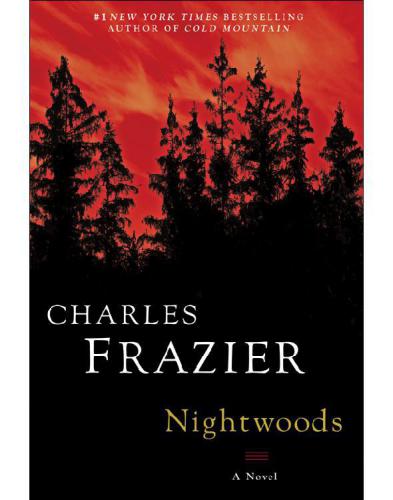
Nightwoods
A Novel
کتاب های مرتبط
- اطلاعات
- نقد و بررسی
- دیدگاه کاربران
نقد و بررسی

September 19, 2011
National Book Award–recipient Frazier’s third novel (after Thirteen Moons) turns around Luce, a beautiful and lonely young woman who has retreated to a vast abandoned lodge in the mountains of Appalachia. Traumatized by negligent parents (“Mother a long-gone runaway. Father, a crazy-ass, violent lawman”), Luce now lives off the land in relative contentment—until her sister Lily is murdered, and Lily’s deeply damaged twins, Dolores and Frank, are sent to live with her. We are briefly allowed to hope for happily-ever-after when an old flame of Luce’s, a thoughtful and kind man by the name of Stubblefield, reenters her life, but he is not the only newcomer to town. Unbeknownst to Luce, her sister’s husband—and killer, Bud, on the prowl for money he believes Lily’s children stole from him, has arrived and will readily perform sudden, cold violence on anyone who stands in his way. Frazier’s characters lack nuance (they are either very, very good or very, very bad) and his prose is often self-consciously folksy. But his great strength, as well as presenting us with a fully realized physical backdrop, is the tenderness with which he renders the relationships at the core of this book, creating a compelling meditation on violence and the possibility that human love can heal even the deepest wound.

September 1, 2011
A Southern gothic narrative that's strong on characters and backwoods atmosphere but undermined by literary affectation.
Though the third novel by Frazier (Thirteen Moons, 2006, etc.) makes occasional reference to Thunder Road, it could inspire a movie as gripping as another with Robert Mitchum, The Night of the Hunter, which also finds two small children fleeing from a dangerous man with a murky past. In this novel, set a half-century ago, the children are orphaned by the murder of their mother and are sent to live with her sister, once the beauty of a small Southern town, now squatting on the grounds of an abandoned lodge at the edge of the mountains. The man in pursuit of the children is Bud, their stepfather and likely their mother's murderer, though he was acquitted of the crime. He knows that the children saw something and might have something he wants, maybe a lot of money. But they don't talk. Or won't talk. Or can't talk. They're almost feral (and certainly pyromaniacs) as well as mute, discovers Luce, their aunt and now their caretaker, who "didn't even really like the children, much less love them. But she loved Lily [her murdered sister] and would raise the children and not be trash." While generally staying within the minds of the characters, the prose occasionally takes literary flight to jarring effect: "Lifeless as these woods are now, all the blood must flow in summertime, whereas Jesus's blood covers the world every day of the year." Or, in Luce's impressions of a sunset: "Expressed as art, the colors would lay on canvas entirely unnatural and sentimental, and yet they were a genuine manifestation of place many evenings in fall." Frazier's characters aren't as likely to think like that as the novelist is. When he tempers his tendency toward filigree and lets his bare-boned, hard-boiled plot progress, the novel packs a devastating punch.
Where his debut (Cold Mountain, 1997) won the literary lottery as an award-winning popular blockbuster, this suggests that Frazier is more than a one-hit wonder.
(COPYRIGHT (2011) KIRKUS REVIEWS/NIELSEN BUSINESS MEDIA, INC. ALL RIGHTS RESERVED.)

May 1, 2011
Here, Frazier is far from the Civil War-era territory of his hugely best-selling debut, Cold Mountain, and his subsequent Thirteen Moons. In late 1950s North Carolina, lonely Luce struggles to care for murdered sister Lily's inward-turned twins while slowly warming to a man who could help her. Meanwhile, Lily's husband (and killer) is looking for money he's sure Lily has hidden. More portrait, less epic, I think; with an eight-city tour.
Copyright 2011 Library Journal, LLC Used with permission.

September 15, 2011
In late 1950s North Carolina, Luce is living in a dilapidated mountain lodge as its caretaker. When her sister, Lily, is murdered by her abusive husband, Bud, Luce becomes the guardian of Delores and Frank, Lily's seriously disturbed twins. At the same time, Stubblefield, who carries a torch for Luce, arrives to check out his inheritancethe lodge. While Luce tries to tame and draw out the twins, Stubblefield tries to tame Luce, and the four come dangerously close to being a family. Then, Bud shows up, convinced that the children know where his hidden money is. When he discovers that the children are learning to speak, he becomes worried that they will tell what he did to their mother and to them. This is a taut narrative of love and suspense, told against a gritty background of bootlegging and violence. The characters are rich and unforgettable, and the prose almost lyrical. This is Charles Frazier at his best. High-Demand Backstory: Just mention a new novel by the Cold Mountain (1997) author, and a line will start forming at the left.(Reprinted with permission of Booklist, copyright 2011, American Library Association.)

























دیدگاه کاربران